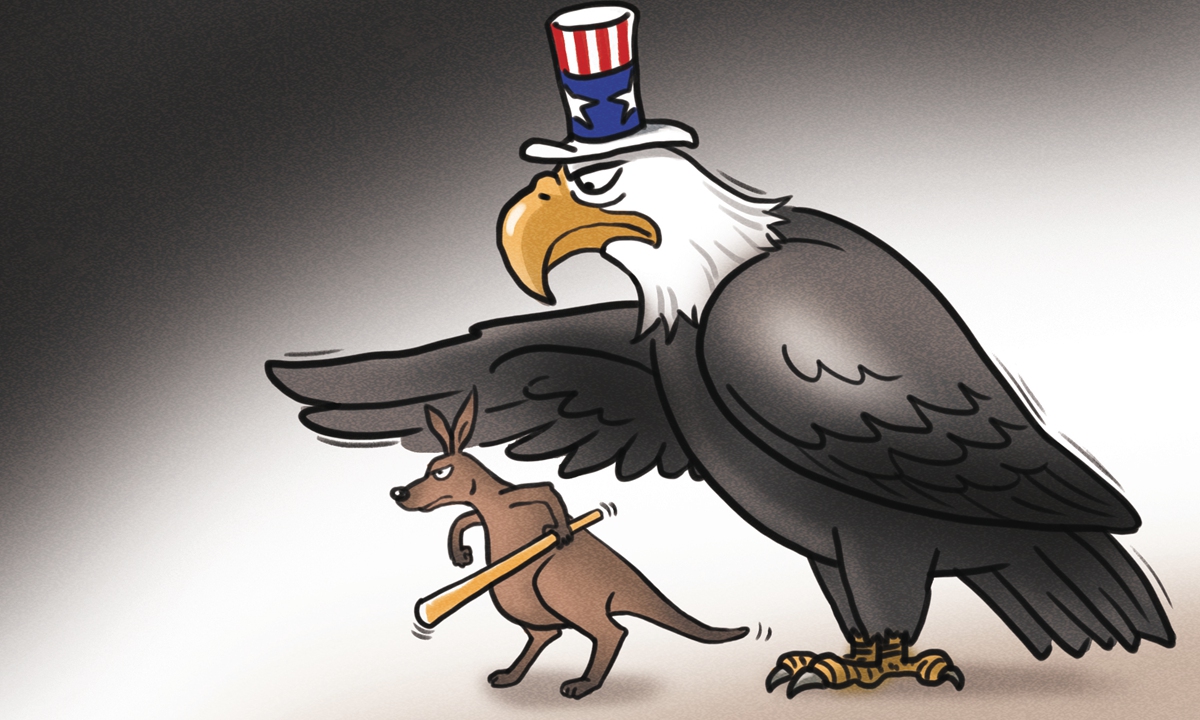Australia immature to be scared of Chinese scholars’ candid opinions
By Chen Hong Source: Global Times Published: 2020/9/10 21:03:40

Illustration: Liu Rui/GT
At mid-day on August 4, I casually glimpsed into my half-full email inbox on my phone with the after-lunch stupor. A new email carrying two lines of red-lettered alert messages caught my attention. The email advised me that the Department of Home Affairs of Australia wanted to send me a letter of importance and requested me to confirm my email address. The sender's title, at the bottom of the email, contained words like "immigration" and "cancelation."
"Another email of some fraud spam," I chuckled while sipping my cup of Earl Grey tea. There had been plenty of such junk mails often starting with portentous warnings, only to extort payment later. However, intuition stopped me from deleting the message and on second thought I sent a reply to confirm my contact details, expecting a reply to tell me some melodramatic story.
Two days later, a formal notification of visa cancelation arrived early in the morning, informing me that my Australian visa, valid until October 2021, was canceled on July 31 on the grounds that I had been "assessed by the Australian Security Intelligence Organisation to be directly or indirectly a risk to security."
This was mind-bogglingly melodramatic. I almost decided to delete it as it was too incredulously irrational.
I started my career as a scholar of Australian Studies in 1987, with my MA and PhD dissertations on works by the Australian Nobel laureate Patrick White. Apart from publishing books, academic papers and translations of Australian literature, culture and society, I teach an annual average of 150 undergraduate and postgraduate students in subjects of Australian studies in my university and in an online MOOC course, where we have an annual attendance of 2,000 students from various universities across China to study aspects of Australia. I also run a national English language contest with Australia as the topic, attracting the best students from around 30 universities as contestants every year. I am one of the most outspoken advocates in China promoting better understanding of and friendship with Australia and the Australian people. Only to be deemed as a "risk to (Australia's) security?"

Chen Hong
I sent a letter in response to the Home Affairs notification, indicated expressly that I refused to accept that assessment and believed a gross mistake had been made regarding my relationship with Australia. I was willing to be contacted by the Australian authorities if further information would be required. The email went unanswered, to date.
Bilateral relations between China and Australia have now hit an unprecedented low, with the context of the Trump administration of the US waging a ferocious campaign against China and Chinese nationals. Washington's persecution of Chinese scholars and journalists has already been ravaging the normal and mutually beneficial academic, education and cultural exchanges between the US and China. Now, Australia, as the self-proclaimed deputy sheriff for America in the Asia Pacific, is picking up steps to tag along.
It has been reported that on June 26, four Chinese journalists' residences were roughly and brutally raided by the Australian Federal Police coordinated by the Australian Security Intelligence Organisation. Their personal belongings were impounded, starkly shedding Australia's self-painted veneer of rule of law. Those who sympathize with China and dare to speak out the truth about China are being intimidated with the marked aim to hush them into submissive silence.
Over the years I have been a frequent commentator taking interviews and publishing opinion pieces across Chinese and international media about China-Australia relations. Some of my perspectives are critical of Canberra's China policy, but any close reading would reveal that the true message has been to eliminate misunderstanding and push for improvement of the bilateral relations. If the Australian authorities are scared of such candid opinions, how could Australia be a mature nation with a confident global outlook?
Maturity and independence lie in the confidence to face up to forthright but well-intentioned criticism, not heavy-handedness and thuggish intimidation which would only reveal paranoid and faintness, or "fear and greed" in the words of a former Australian prime minister. However, as A. A. Phillips, an Australian literary critic, said wisely in his famous essay on Australia's cultural diffidence, "The opposite of the Cringe is not the Strut, but a relaxed erectness of carriage."
To date, the prospect for me to reclaim my Australian visa seems more and more remote. Being an optimist in nature, I look forward to a more positive and constructive mind-set in Canberra, which is the key to bringing the bilateral relations out of its nadir to the right track.
The author is a professor and director of the Australian Studies Centre, East China Normal University. opinion@globaltimes.com.cn
RELATED ARTICLES:
Posted in: VIEWPOINT,ASIAN REVIEW,OTHER REGIONS